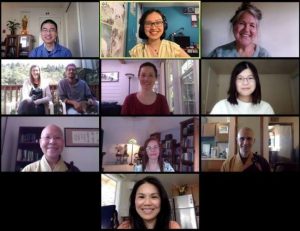Young Voices is a special project from Buddhistdoor Global collecting insightful essays written by high school students in the US who have attended experiential-learning-based courses rooted in the Buddhist teaching. Inspired by and running in parallel with BDG’s Beginner’s Mind project for college students, Young Voices offers a platform for these high school students to share essays expressing their impressions and perspectives on their exposure to the Buddhadharma and its relationship with their hopes, aspirations, and expectations.
Olivia Yang wrote this essay in the spring of her senior year for her “Listening to the Buddhists in Our Backyard” class at Phillips Academy, a high school in Massachusetts. Originally from North Carolina, Olivia plans to go on to study computer science and comparative literature.

What to Do with Impermanence
What should we do with impermanence?
As a high schooler, my answer for a long time would probably have been something along the lines of escape it. Drill formulas into your brain until you can regurgitate them in your sleep. Shuffle flash cards until the white of the paper becomes a worn yellow, proving adequacy. Uncertainty, imperfection, and incompletion can be scary, especially in competitive and high-pressure environments.
But now I’m beginning to doubt this answer. Recently, I have been lucky enough to participate in an experimental education model called the Workshop, which immerses students in a term of project-based learning that takes us out of the classroom and into the real world. As a group of 22 students, we Workshoppers (as we affectionately call ourselves) have opted to replace our five distinct classes per term with one larger, public-facing project. As part of our work, we also discuss pedagogical methods and sustainable ways of thinking, becoming, and living. I have also had the opportunity to work more closely alongside five of my peers and my teachers, Mr. Andrew Housiaux and Ms. Chenxing Han, to develop an understanding of local Buddhist traditions in our surrounding Merrimack Valley community.
For two weeks, our group traveled to temples, centers, and academic institutions to speak directly with monastics, laypeople, and scholars about their experiences engaging with Buddhism. All of the wonderful people we visited were generous enough to share their wisdom and open their doors to us without asking for anything in return. In just over two weeks, my peers and I have been overwhelmed by a profound empathy and kindness that has redirected our academic, social, and emotional trajectories.
Amy, an influential layperson at Wat Boston Buddha Vararam, a Thai Theravada temple, shared her story of leaving Thailand in the hope of seeking more freedom. Her words spoke to the sheer strength and determination of her character and of embracing new possibilities. Buddhism teaches us about the reconciliation of suffering and the acknowledgement of life’s transience—and almost every day that we visited temples, monastics and laypeople would remind us of this impermanence through their words and actions. As Amy spoke, the lunch table (the temple was gracious enough to offer us food after Sunday service) fell silent. Her words spoke to a universal truth: no story is static. No story is finished.
Other monastics, laypeople, and friends have been gracious enough to share their own experiences and thoughts on impermanence. Some discussed their framings of death and the cycles of life as a recognition of impermanence in our world. Venerable Manzhong of the American Wisdom Association (般若寺) spoke of the potential destruction of Earth and the possibility of transcendence beyond the physical plane. These spectrums of impermanence have helped to guide my own understanding of the self, and I have slowly begun to realize that my own story is always being written. My own story may never be finished. Within our work studying Buddhism and speaking with monastics, my Workshop group found a comfort to that impermanence (Skt: anitya): change is inevitable and necessary.
The Buddha famously said: “All compounded things are subject to vanish.” At a time in my life when I am wrapping up my high school career and transitioning to college and adulthood, the idea of impermanence is actually profoundly grounding; at any point in time, we have the power to redirect our stories and redirect our lives’ work.
It’s daunting, but there’s also a freedom in incompleteness. I’m beginning to find that one of the most important parts of learning is in the humility of knowing nothing. I can see it now: what I know now is vast compared to where I first started just a few weeks ago. And yet, at the same time, I know that I know nothing.
Buddhism embraces this humility and ceaseless diligence as a fundamental feature of life itself. The recognition of ignorance and the reconciliation of change exist in constant juxtaposition with one another. To me, the cultivation of generosity hinges on this delicate fulcrum. As I make decisions about the self and the community I want to envision, leaning into change will be profoundly valuable. These are some of the lessons I have learned in my time thus far in our Workshop project, despite being only three weeks in. As such, even the story of what I have yet to learn has barely even started.
Engaging with Buddhism through physical, bodied experiences has helped me to reimagine what it means to be a Buddhist in a world that is constantly being rewritten. As a group, we have already been confronted with the idea that no stories or conditions can simply “be.” Rather, they had to “become.” The acknowledgement of impermanence in all its forms—in the retelling of history, in the understanding of the self—is essential to developing the flexibility needed to build practices of kindness and understanding. So I ask again:
What do we do with impermanence?
My answer now: embrace it.











